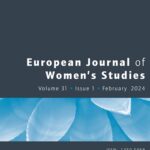 European Journal of Women’s Studies (Web); Júlia Garraio (Univ. of Coimbra) and Hülya Adak (FU Berlin)
European Journal of Women’s Studies (Web); Júlia Garraio (Univ. of Coimbra) and Hülya Adak (FU Berlin)
Proposals by: 31.10.2024
Aesthetic interventions – including art, literature and film – have the potential to challenge, renegotiate and reconceptualise understandings of gender-based violence, sexual harassment and sexual violence. This Special Issue seeks to address the critical potential of aesthetics to (re)create the interconnections between gender, violence and sexuality, and to incite feminist + activism and transformation (Altınay and Petö, 2022). The question of who speaks and under which conditions, what is said and how, and who listens, hears and actively engages remains as crucial as ever. The Special Issue will focus on how artists, playwrights, writers, poets and filmmakers have engaged with gender-based violence, sexual harassment and sexual violence. It will also examine how audiences, activists and the public at large appropriate, interact with and respond to the aesthetics of works and narratives that deal with these forms of violence.
The articles of the Special Issue can address one or more of the following questions:
- What are the ethical implications of aesthetically representing gender-based violence, sexual harassment and sexual violence? How is ethics relevant to reading and responding to aesthetic narratives and depictions of gender-based violence, sexual harassment and sexual violence?
- How can aesthetic representations of gender-based violence, sexual harassment and sexual violence be pivotal in instigating social change? How do works of art, film and literature operate together with emotions and shared imaginaries to generate interest about the topic?
- In what ways can the arts potentially render legal and academic language and tools accessible and legible to survivors, activists and the broader public? How can artistic productions be used to foster debate about the meaning of justice for survivors and their communities? How can the arts, literature, fiction and film be appropriated by different audiences and activists with their variegated agendas? Read more … (Web)
Source: Gender Campus
